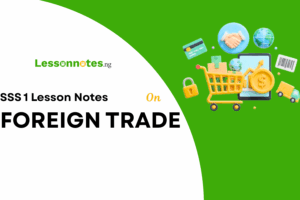Foreign Trade – Custom And Excise Authority SS1 Commerce Lesson Note
Download Lesson NoteTopic: Foreign Trade – Custom And Excise Authority
CUSTOM AND EXCISE AUTHORITY
The Customs and Excise Authority is an agency charged with the responsibilities of assessing and collecting revenue due from import and export. It is a revenue-collecting organ of the government. The department of customs and excise under the Ministry of Internal Affairs.
Customs and excise authority collect the following:
- Import Duties: They collect taxes imposed on surplus goods and services that come from other countries into a particular country, it is also known as traffic and they belong to what we call customs duties.
- Exporter Duties: These are taxes imposed on surplus goods and services of a country that are sent to other countries.
- Excise Duties: are taxes imposed on locally made goods.
FUNCTIONS OF CUSTOMS AUTHORITY.
- Prevention of Smuggling: Smugglers are prevented from bringing or taking goods in or out of the country.
- Collection of Data On Import and Export: Custom authorities must compile statistics on import and export.
- Generation of Revenue: The department is also charged with the responsibility of generating revenue for the government form of import and export duties.
- Collection of Taxes: It collects taxes on imported, exported and locally produced goods.
- Supervision of Bonded Warehouse: It monitors and supervises bonded warehouses where goods are stored until the duties are paid.
- Checking Illegal Trafficking of Naira: The department performs the function of checking illegal trafficking of the nation’s currency.
- Customs authority provides information to traders on duties to pay on the importation and exportation of goods.
- Implements government policy on restriction of goods.
EXPORT PROMOTION COUNCIL
Export trade: the selling of goods/services of a country abroad. It includes goods and services sold to other countries. Nigeria’s export products are cocoa, crude oil, rubber, cassava, etc.
Export can be visible and invisible. Visible exports are tangible goods and invisible are services rendered abroad.
Exeter port: is the re-exporting of goods that have been imported from other countries i.e. goods imported to a country later re-exported to other countries.
FUNCTIONS OF NIGERIA EXPORT PROMOTION COUNCIL
- Export Funding: It provides financial facilities to export e.g. insurance and credit guarantee schemes.
- Exporting Developing Activities: It introduces measures to increase the volume and quality of goods to be exported.
- Provision of Trade Information: Information is provided through the publication of trade journals and export directives.
- Training Activities: It organizes seminars and workshops on export management for people engaging in international trade.
- Publicity Function: The council prepares and issues publications containing information about the activities of the council.
- Activities Relating To Export Marketing: It gives information about Nigeria ex[ort in the international market and how to improve its marketability.
Export document preparation etc.




















